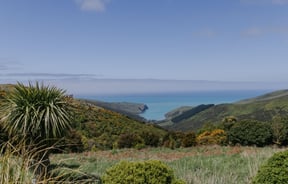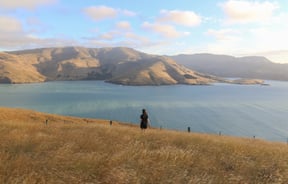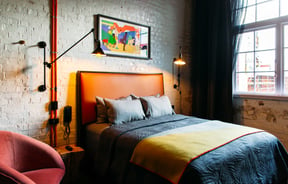The Emerging Organic Wine Brands of Waipara, North Canterbury

If you look beyond the standout Waipara wine brands we all know and love, four passionate young Canterbury winemakers are doing things a little differently. We spoke with each of them to better understand their inspiration and wine styles.
Words by: Johnny Gibson
Photos by: Supplied
This group of winemakers produce forward-thinking organic wines that are true to themselves instead of making what the market dictates. They work without many of the restrictions that more established brands have.
So, how do they manage this? By working in smaller volumes, they can experiment with varietals and blending styles. They lease space in other wineries to make and store their wine, keeping overheads low, and oversee the whole process themselves, from managing and maintaining the vineyards and working closely with growers they buy fruit from to winemaking, marketing and sales.
These fab four have worked vintages all over Aotearoa and the world, gaining experience and appreciation of the craft from old-world ways to the emerging scene of natural wine.
15 Minute Bottles - David Collins

When did you start 15 Minute Bottles, and what were you doing before?
15 Minute Bottles was established in 2021 when we all returned to New Zealand during the pandemic. It's a real collaboration. My wife Lana and I set it up with our good friends Thomas and Anne, who are based in Cromwell, where they are making our Central Otago cuvée. The four of us dreamed of making wine together while living in Europe.
Describe your brand and what sets you apart.
Our exposure to energetic and thought-provoking natural wines coined the phrase "15 Minute Bottle," which represents the convivial dining we experienced, where a bottle of wine was shared between a table of people, laughing and having a good time.
Where do you source your fruit from?
We source fruit from a handful of growers around Canterbury. The vineyards are a mix of certified and uncertified organics. What's unique about our Waipara growers is that they do all the work themselves, whereas many vineyards will use contractors. In the future, when our financial situation allows, our goal is to grow our own fruit on our own land, but right now, it's a privilege to work with people putting all their energy into it.
What do you love about winemaking?
I came to winemaking the long way around. I studied landscape architecture and then began cooking while living in Berlin. My winemaking style is influenced by the philosophies of the restaurants I worked in, which played with local and seasonal ingredients. It's the combination of being creative, hands-on, working with what the season has provided and working collaboratively with Tom, Anne and Lana to produce the bottles we imagined in the early days, that I love.
Where can people best experience your wine?
It's been great to have been supported by so many owner-operator restaurants and bars around New Zealand. Londo in Christchurch, Pici in Auckland and Puffin in Wellington, have all been big supporters from the beginning. We love to eat and drink in their establishments when we get the chance.
How should people best experience your wine?
Our wines pair best with good people, convivial dining and a lot of laughs. We hope it will be enjoyed at 2 in the afternoon or 2 in the morning.
Wines produced: Pet Nat from Pinot Noir, Riesling, Pinot Noir Rose, Savignon Blanc and Syrah in North Canterbury. Riesling and Pinot Noir in Central Otago.
Bryterlater Wines - James Opie

When did you establish the Bryterlater Wines brand, and what were you doing before that?
I'm from Central Victoria; I came to New Zealand in 2013 to study winemaking and viticulture at Lincoln University. Whilst studying, I was lucky enough to meet some fantastic and inspiring people in the industry through working with Black Estate and Alex Davies at Shop Eight, now of Gatherings. I worked in Tasmania, Bendigo, France, Germany, England and Marlborough after university. Bryterlater begun in 2019.
Describe your brand and what sets you apart.
We seek to compose wines from the vineyard. Using wild yeast and minimal handling in the winery, we steer wines toward an old-world slant with a vibrancy of modernity.
Where do you source your fruit from?
The vineyards I source fruit from are certified organic or organic conversion. Pinot noir is sourced at The Barbour Vineyard on the gentle slopes of the Waipara Valley, with soil composed of clay atop fragmented limestone. The grapes from this site are used in our Petina Pettilant Naturel and our Fredrick Pinot Noir. The grapes for our ‘Sauvignon Blanc Still Life’ and ‘Pinot Noir Ernest’ are sourced from The Good Family Vineyard on Georges Road. The soils are composed predominantly of free-draining gravels, which promotes spectacular acidity and bright, vibrant flavours in the wines. The Bedford Vineyard is also on Georges Road and has similar soils; this is the Riesling Vineyard - bright, fresh, salivating acidity.
What do you love about winemaking?
I love creating wines of a place. Wines represent the soils they are grown on and the climate they mature in. Bringing a wine to fruition can be incredibly straightforward, and sometimes our role is more custodian than creator. I love seeing the wines differ from vintage to vintage and show their creation, not mine.
Where can people best experience your wine?
Gatherings, Londo, Vino Fino, 5th Street, Pici, Puffin, Highwater, Celeste, Everyday Wine, Cave a Vin and Odeon.
How should people best experience your wines?
Bryterlater is named after a Nick Drake album from 1971; this is a great match.
Wines produced: Pinot Noir, Sauvignon Blanc.
Lele - Liam Kelleher

When did you start Lele, and what were you doing before?
Lele's first wine was in 2019. It was a field blend of white grapes, as that was the only grapes I could get my hands on. Fruit is hard to find. Before that, I spent 15 years in London, where I owned and ran a wine store, which then became two restaurants with friends. The environment that came with it is what grew my love for wine, as I spent heaps of time with young winemakers doing things differently. It was an exciting time with many parties, European wine adventures and harvests around the world.
Describe your brand and what sets you apart.
I'm not trying to set myself apart; I want to make wines I want to drink and are accessible to a range of people. Being small, unknown, and not having endless funds means I need to be pragmatic and make the best wines I can with what I have.
Where do you source your fruit from?
The fruit comes from a vineyard Will of Vita, and I lease together with Black Estate, another Pinot Noir block.
What do you love about winemaking?
I love that harvest is one time a year; it's real seasonality, unlike brewing. I'm always figuring it out and learning how to improve the wines - there's nothing else I would rather do.
Where can people best experience your wine?
You can pick them up from Frances Nation or head into Londo for a glass.
How can people best experience your wine?
I love cooking, eating and drinking other people's wines, so I recommend people do the same. I want to make wines people can consume a lot - thirst-slacking!
Wines produced: Two Pinot Noir, two white field blends, Riesling and Rosé.
Vita - Will Lyons-Bowman

When did you establish Vita, and what were you doing before?
Vita had its first harvest in 2020. It was a very fortunate year to start in North Canterbury, with great fruit quality leading to concentrated, focused wines. Before Vita, I was learning - still am - about different approaches and philosophies toward how to grow grapes and make wine. I'd had great experiences at producers I hold in high regard: Millton in Gisborne, Greystone in North Canterbury, Olek Bondonio in Barbaresco and Black Estate in North Canterbury. In particular, Black Estate helped hone my already developing thoughts on how to farm vines and make wine.
Describe your brand and what sets you apart.
Vita is all about translating the energy from the vineyard into the bottle, with as little interference as possible. All the wines are fermented using their indigenous yeast, unfined, unfiltered and with zero additions of any kind.
Where do you source your fruit from?
I source fruit from a handful of certified organic growers. I've been lucky to work with Black Estate, Greystone, Mount Edward, Carrick and Terrace Edge. And since last year, Liam of Lele wines, Black Estate and I have been leasing a block together in North Canterbury - an exciting project! All of these growers farm in a way that aligns with my philosophies.
What do you love about winemaking?
I love the wild variation you see from season to season - it's challenging and inspiring. Wines can mirror the place they're from, so responding to both the site of the vines and the conditions in which they grew that season is endlessly interesting and rewarding.
Where can people best experience your wine?
In my hometown, Christchurch, you can find the wine at Londo, Gatherings, Downstairs, Vino Fino and The Beer Library. Further afield, you can enjoy it at some of my favourite spots like Pici, Omni, Bar Martin, Margot and Puffin, to name just a few.
How should people best experience your wine?
Drink them when and how is best for you. I love drinking my wines with vigour, alongside my favourite people with truckloads of delicious food, as much as I enjoy drinking my wines quietly and thoughtfully at home with my wife Jane while our two teetotalling dogs, Mary and Dot, watch on.
Wines Produced: Riesling, Pinot Gris and Pinot Noir.
Neat Christchurch & Canterbury Places
Imōto Lounge Bar

Looking for your next fun night out in Christchurch? Well, there’s someone we’d love to introduce you to.
Six Ounces

There’s nothing quite like a cosy neighbourhood haunt and six ounces is exactly that.
Hinewai Reserve

Not far from the township of Akaroa (walking distance if you’re really game), lies an idyllic haven of regenerating native bush nestled in the wild south east corner...
Old School Collective

Head north from Christchurch along State Highway 1, and you’ll soon come across the rural North Canterbury township of Waikuku, which is home to The Old School Collective.
1999 House of Nails - Ferrymead

Mani-pedi lovers residing in or near Christchurch’s seaside suburb of Ferrymead, 1999 House of Nails is the place to go to fulfil all your builder gel manicure and...





